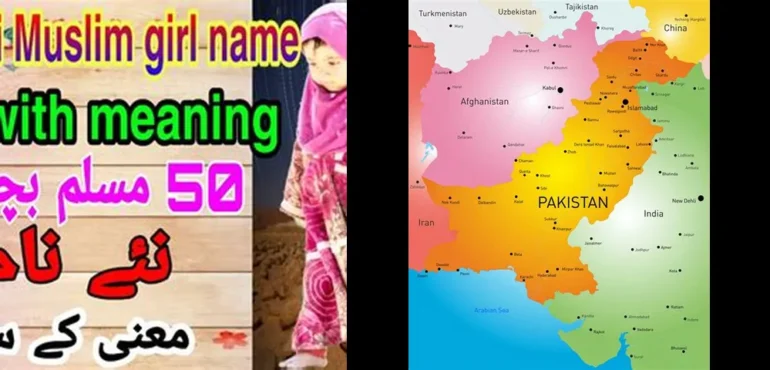Are you curious about the vibrant and diverse names from Pakistan? Well, get ready to embark on a fascinating journey through the rich tapestry of Pakistani names. From traditional gems rooted in history to the full name of Pakistan itself, this blog post is your ultimate guide to the captivating world of Pakistani names. So, sit back, relax, and let’s dive into the enchanting realm of names from Pakistan.
The Rich Tapestry of Names from Pakistan
Names are not merely identifiers but are imbued with the essence of a culture, embodying its history, values, and the stories of a people. This is especially true for Pakistani names, which are woven into the very fabric of the nation’s society. With a nod to their significance, let’s delve into the origins and meanings of these monikers that resonate with the soul of Pakistan.
Roots of Pakistani Names
The mosaic of Pakistani names reflects the Islamic faith, which serves as the cornerstone of the country’s identity. These names often encapsulate profound meanings, with each one a whisper of virtues, divine attributes, or an echo of historic Islamic figures. It’s a remarkable fusion of linguistic heritage, as Arabic, Persian, and Turkic languages contribute to the etymology of these names, painting a picture of Pakistan’s rich cultural tapestry.
For instance, names like Fatima and Hassan resonate with historical reverence, linked to cherished figures in Islamic tradition. Others like Aziz (meaning ‘beloved’ or ‘respected’) and Rahim (meaning ‘merciful’) are reflective of the divine attributes ascribed to Allah, thereby embedding a spiritual dimension in one’s identity.
| Date | Fact |
|---|---|
| Aug 21, 2023 | Pakistani names predominantly originate from Arabic, Persian, and Turkic roots, reflecting the country’s Islamic heritage. |
| — | Common Pakistani boy names include Muhammad, Abdul, Ali, and Mohammad. |
| — | Traditional Pakistani names such as Abbas, Ahmed, Adnan, and Amin are widely used. |
| — | The official name of the country is the Islamic Republic of Pakistan. |
| — | Popular Pakistani names include (male) Ali, Muhammad, Yusuf, Bilal, and Hamza; (female) Noor, Mariam, Ayesha, and Fatima. |
Names like Noor (meaning ‘light’) illuminate the essence of beauty and purity, while Mariam, the Arabic version of Mary, carries with it a timeless grace. In the male names, Abdul serves as a prefix meaning ‘servant of’ and is often paired with one of the 99 attributes of Allah, such as Abdul Rahim or Abdul Aziz.
Adorning a child with such a name is an expression of a deep-seated hope, a silent prayer that the child will embody the qualities their name signifies. As guardians of their heritage, Pakistani parents often choose names that are not just a badge of identity but a compass guiding their children towards virtues they are revered and esteemed for.
Within this intricate web of names, each strands its own story, a narrative intertwined with faith, culture, and linguistic beauty. As we progress through the tapestry of Pakistani names, it becomes evident that each name is much more than a simple tag; it is a legacy, a declaration of one’s roots, and a profound reflection of collective values.
Let us continue to unravel this tapestry, exploring how the traditional names of Pakistan carry the weight of history and the aspirations of the future.
Traditional Pakistani Names
In the heart of Pakistan’s rich cultural landscape, traditional names carry the echoes of a profound legacy. Names such as Fatima, Muhammad, Aisha, Ali, Yusuf, Hamza, Maryam, Bilal, and Noor resonate with the spiritual depth and historical longevity that is intrinsic to Pakistani heritage. These names, steeped in Islamic tradition, are lovingly chosen for their auspicious meanings and the honor they bestow upon the bearers.
Generations of Pakistanis have treasured these names, handing them down as precious heirlooms. The name Muhammad, not only popular in Pakistan but across the Islamic world, honors the revered Prophet of Islam. Ali, another esteemed name, pays homage to a pivotal figure in Islamic history, known for his wisdom and valor. It’s not just their historical significance that makes these names perennial favorites; it’s also the virtues and attributes they represent—courage, piety, and integrity.
Other names like Abbas, meaning ‘lion’, and Ahmed, one of the many beautiful names of the Prophet Muhammad, highlight the valor and grace with which Pakistani parents hope to imbue their children. The names Adnan and Amin further exemplify the virtues of traditional Pakistani names, representing the concepts of ‘settler’ and ‘trustworthy’, respectively. These names are not only a nod to an individual’s faith but are also reflective of a collective identity that cherishes its historical and spiritual linage.
As for baby boy names, Muhammad stands out as the epitome of the traditional Pakistani naming convention. Its prevalence is a testament to the profound respect and admiration for the Islamic prophet. Similarly, names prefixed with Abdul—meaning ‘servant of’—are commonly paired with one of the 99 attributes of Allah, as in Abdul Rahim or Abdul Aziz, instilling a sense of humility and servitude to the divine from an early age.
Most Common Baby Boy Names in Pakistan
When it comes to selecting a moniker for a newborn boy, Pakistani parents often favor names that exude a sense of strength and spiritual significance. The names Muhammad, Abdul, Ali, and Mohammad top the list of choices, each one deeply anchored in the Islamic faith. The name Muhammad is not only an homage to the Prophet but also a wish for the child to emulate his qualities. Ali, synonymous with bravery and nobility, is a name that carries the legacy of the Prophet’s family and is cherished across the Muslim world.
Best Pakistani Names for a Girl
The joy of naming a daughter is embraced with loving anticipation, as parents sift through a myriad of beautiful options. Names like Durnaz, meaning ‘a shining star’, and Eshaal, signifying ‘flower in heaven’, are chosen with the hope of capturing the essence of beauty and purity in their daughters. Ebrah, another enchanting choice, suggests ‘wisdom’—a trait that parents aspire to see flourish in their child. Effat, denoting ‘chastity’, is equally cherished for its connotation of virtue and dignity. Each name is a whisper of the aspirations parents hold for their daughters, a blend of grace, strength, and spirituality.
As we delve further into the rich tapestry of names from Pakistan, we uncover a world where each name is more than a mere label; it is a story, a prayer, and a timeless connection to a shared heritage. These names are not just prevalent in Pakistan but have crossed oceans, creating a sense of unity and identity among the global Muslim diaspora.
The Full Name of Pakistan
In the mosaic of global nations, the name of a country often embodies its heritage and ideological foundations. Such is the case with the official title of Pakistan, the Islamic Republic of Pakistan. This designation not only highlights the nation’s Islamic identity but also underscores the framework of its governance, rooted in the principles of Islam. The name itself is a bridge between the nation’s devout spirituality and its aspirations as a sovereign republic.
With Islam being intricately woven into the social and political fabric of the country, the name ‘Islamic Republic of Pakistan’ is a powerful beacon that guides its legislative processes and cultural ethos. It is a reflection of the collective consciousness of its people, who take pride in their Muslim heritage while navigating the modern world. This profound connection to Islamic values is mirrored in the personal names of its citizens, many of which honor historical figures and attributes associated with the faith.
Moreover, the full name of Pakistan serves as a testament to the vision of its founders. It is a narrative that speaks of struggle, unity, and the quest for a homeland where religious freedom and cultural identity could flourish. The very etymology of Pakistan—land of the pure—resonates with the moral fiber and the lofty ideals that the country strives to uphold. In essence, the name is not just a geopolitical label, but a declaration of the nation’s character and its enduring legacy.
From the bustling streets of Karachi to the tranquil valleys of Khyber Pakhtunkhwa, the country’s name echoes the aspirations of its people, binding them in a shared destiny. As the Islamic Republic of Pakistan moves forward, it carries with it the profound significance of its name, reminding its citizens and the world of its commitment to preserving its Islamic heritage while promoting peace, progress, and unity.
Q: Do Pakistanis have Arabic names?
A: Yes, the majority of Pakistani names are derived from Arabic, Persian, and Turkic names.
Q: What is the typical name of a Pakistani boy?
A: The most common baby boy names in Pakistan are Muhammad, Abdul, Ali, and Mohammad.
Q: What are Pakistan’s traditional names?
A: Some of the traditional names of Pakistan are Abbas, Ahmed, Adnan, and Amin.
Q: What is Pakistan’s full name?
A: Pakistan’s full name is the Islamic Republic of Pakistan.



